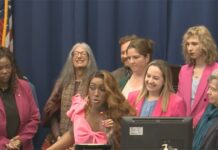
[This column appears in the November/December 2020 issue of Boston Spirit magazine. Subscribe for free today.]
Since the coronavirus changed the social landscape for everyone all over the world, many groups and organizations pivoted to reconnect people using online platforms like Zoom and Webex. Organizers and participants see this switch as a temporary compromise until everyone can be back in person again. But there is a group of people who have been working on a virtual meeting space for many years, long before anyone heard of COVID-19 or social distancing.
Twenty years ago, Alice Fisher, 79, from Boston’s South End along with her friends David Aronstein and Michael Connolley began discussing ideas to organize the dispersed LGBTQ older adult community. Once the bar scene faded from people’s agendas, there was nothing left to bring older people together. The three saw a huge potential in the rapid rise of online hook-up sites that were taking over the social scene in the community. The hope was that these organizations could help them by using their sophisticated system of online communication to connect older LGBTQ adults, not for similar hook-ups but for social contact. The group did their research and learned about a division within Manhunt that was committed to helping the LGBTQ community. Manhunt became an eager partner, but the project soon became too time-consuming to bring into fruition.
Around this time in Massachusetts, the elder service network was becoming increasingly inclusive and competent around the idea of LGBTQ older adults. As a result, there was a groundswell of opportunities to engage LGBT older adults through congregate meal sites and other social groups that were forming specifically for LGBTQ older adults.
During this renaissance for the older LGBTQ community, Fisher’s group explored a new avenue—the idea of lifelong learning—and started New England’s first LGBTQ LLI at Wheelock College (which later moved to UMass Boston’s Osher Lifelong Learning Institute). This new venue provided a means to organize people for social and educational endeavors. One of the first lessons learned was the value of partnering with an established and resourced organization. But, as successful as their LLI was, they still faced the growing challenges of their aging population who found difficulties in transportation and accessibility especially in the winter.
To accommodate those who could no longer travel to classes, the group then tried a different tactic and developed a website called Stonewall Seniors to keep people connected. The technical challenges kept them from doing anything more than a simple website with articles of interest to LGBTQ older adults. They didn’t give up, and Fisher and her friends kept dreaming up ideas that would keep their increasingly dispersed community together across the expanse of space, time and aging.
In 2014, Massachusetts passed legislation for the first-in-the-nation special statewide Commission on LGBT Aging. The commissioners were selected from many areas of public life and were tasked to come up with specific recommendations for the legislature. One of those recommendations was the development of an LGBTQ Virtual Senior Center. Members of the Commission, aware of the groundwork of Fisher’s team, which now included Michael Immel, 70, a retired landscape designer in Mattapoisett, invited them to some of the Commission meetings to help them explore this idea.
Fisher and Immel joined forces with Anyah Prasad, 32, from India, a trans graduate student at UMass Boston’s School of Gerontology who had been an intern at The LGBT Aging Project at Fenway. They knew that in order to move forward and make this a reality, they would need to conduct a statewide needs assessment and additional research. With funding from Partners Health (now Mass General Brigham) and from The Boston Foundation’s Equality Fund, the new Virtual Senior Center team launched focus groups all across the state of Massachusetts.
The goal of the focus groups was to go beyond a typical online presence to truly investigate the role a virtual senior center could play in the lives of LGBTQ older adults. After a year of data collection, the team found several strong themes that surfaced in all the groups. They expected to find the challenges of participating in activities as folks age, which was evident, but they were surprised to find that one of the unfulfilled needs people mentioned again and again was that of love and companionship. Even if spaces like senior centers or assisted living facilities were welcoming to LGBT older adults they may not promote sexuality and relationship building, but an online virtual space would open that door. The research also indicated that many online sites only offer resources for younger LGBTQ people, which excluded older adults, but a virtual senior center could be a place where all the resources were focused on older adults (such as coming out groups or HIV support groups for older adults). One of the roadblocks the group encountered at almost every focus group was the digital divide. Older adults just didn’t seem interested or able to navigate in a virtual environment. This would be a challenge.
Then came the pandemic. The coronavirus and the ensuing national shutdown kept everyone, especially vulnerable older adults isolated from one another. Overnight all the LGBT congregate meals and social groups came grinding to a halt. Then, like lights slowly flickering on after a blackout, seniors started finding their way to different Zoom drop-in groups for LGBTQ older adults. Some were virtual meal sites, some were online LLI classes and others were just a place to meet and check in with each other for moral support during these challenging times. Whatever the online venue, these places became a lifeline for LGBTQ seniors who were cut off from the world.
Suddenly Fisher, Immel and Prasad realized that everything they had been exploring was more possible than they imagined. All it took was a global pandemic to set things in motion!
“This is better than we ever imagined,” Fisher explained. “I am at the point in my life where I just don’t have the energy to go out all the time to attend community events. I was missing out on so much. Now all these events have come right to my door. Tomorrow I am going to LA to attend an event at their LGBT Virtual Senior Center and next week I am attending another one in New York City. And I don’t have to pack a bag!”
Fisher also commented about the feeling of seeing all the different faces at her first zoom event in March. “I attended the LGBT Aging Project’s Drop-in Group for LGBTQ older adults and I was amazed. There before me were faces I hadn’t seen in years. Many of these folks were ones who stopped coming to Stonewall at OLLI because it just became too much for them. Now we were together again and it was wonderful. As we get older going out and staying connected got to be so difficult, but now we can do anything from our kitchen table! Last week I attended a gathering about voting hosted by The Theater Offensive. I was very late, but when I signed on this young man of color exclaimed, ‘Oh, look, Alice is here with us.’ You have no idea how good that made me feel. I was seen and welcomed.”
With new vigor and armed with the research from their focus groups, Fisher, Immel and Prasad are collaborating with the LGBT Aging Project at Fenway to carry the Virtual Senior Center to the next level of its development. “We are hoping to attract other community partners and corporate sponsors that will provide the resources to make this into a lasting reality for our community. We want to know there will be a means to stay connected as we age” Fisher said.
As we have navigated new ways to connect during this time, we have found an incredible means of community that will keep our LGBTQ older adults together long after this pandemic is over. Fisher adds, “The virus may go away, but the challenges around aging and isolation won’t. This is what will keep us connected.” One of Fishers favorite quotations is ‘An artist is the morning star of the revolution.’ Perhaps she doesn’t realize that she has been that artist ever since she started dreaming up ways to keep us together. [x]
For more about the development of the LGBTQ Virtual Senior Center, contact Bob Linscott at BLinscott@fenwayhealth.org.
Bob Linscott is assistant director of the LGBT Aging Project at The Fenway Institute.
Not a subscriber? Sign up today for a free subscription to Boston Spirit magazine, New England’s premier LGBT magazine. We will send you a copy of Boston Spirit 6 times per year and we never sell/rent our subscriber information. Click HERE to sign up!








